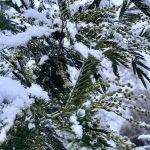On reconnecting with ourselves and our tribes
Last week, I posted about making my winter menu, and good job I did – the snow arrived in Bristol this weekend. It’s officially winter. Everyone in my close family celebrates their Birthdays in winter, so snow inspires me to think about my ancestry. In liberation psychology, ancestry is important as it supports the process of re-authoring the authentic stories of people who, due to racial or other forms of abuse, experienced a loss of identity and agency. I work on re-authoring people’s individual and collective agency a lot across all my services. It can be counselling, coaching and also social media consultancy.
Social media lends itself so nicely to researching our roots. It also allows those who can afford access to the Internet to retell their own stories without gatekeepers, editors or publishers. We all become the scribes of our own lives. Thus, we can also capture our journey into the past and our ancestry. That in itself can feel ever so liberating. Not many people know this, but my main goal for my personal social media channels is to document my journey – primarily for myself, not for the validation of others. All my social channels are my form of one complex personal journaling.
For me, posting online is a great way to capture my life for my reflections and for any of my friends who may wish to join it or catch up on it. Just like we used to travel, take photos, develop them and then invite friends for a small dinner and screening of photos, we can now do all of it in real time and engage them all in the reminiscence around our memories-in-the-making. I think it’s quite magical.
So magical, in fact, that I have a strong, quite aggressive resistance towards the term FOMO (fear of missing out) – a classic presentation of the negative tech bias. When people speak of travel and sharing photos online, mostly the first thing I hear is complaints and that sense of “I wish I were there too, and I am not”. The term was amplified by the advertising industry and slowly entered our dictionary. I wish it didn’t.
The intention to feel jealousy and FOMO is our choice because if we were to connect with some positive emotions, we could also feel awe, appreciation of beauty, and gratitude that we can see what our friends are exploring and love and connect with their experiences at that moment. Yet, often, we choose to connect with individual comparisons instead. That, of course, may make us feel sad and low. And again, we feel like our lives are not good enough, so maybe we will book that holiday even if we can’t afford it. And so the cycle of consumerism continues. But another way of experiencing online memories is possible. It is just in front of us; we must choose positive connections with others.
How we experience content on social media depends on our offline mental state, actually. It is not social media that shapes our mood. It’s how we show up online (our mental, spiritual, and social state) that defines how we will experience social media content. Social platforms will amplify it, of course. Some, sadly, will aim to amplify mainly our negative reactions – which is why it is even more important to connect and intentionally practice positive reactions in those spaces. When I was socially isolated, those negative perspectives of FOMO were my default, too. Still, I worked on it (offline and online), and I am now back to a more positive, kinder experience of friends’ content on social media. Every time I see my friends on a journey, I am happy for them. I learn something new, and I feel honoured to be invited into their intimate experience of the world.
Of course, for this re-authoring journey to maintain authenticity, we need to venture out on it offline and then capture it and share it with our online tribes as authentically as we can, remembering to stay safe, too. Those two realms of our reality – offline and online – are interconnected now! If we embrace the skilful use of online platforms, we can navigate those interconnected realities smoother, with positive intent and with great benefits to our well-being.
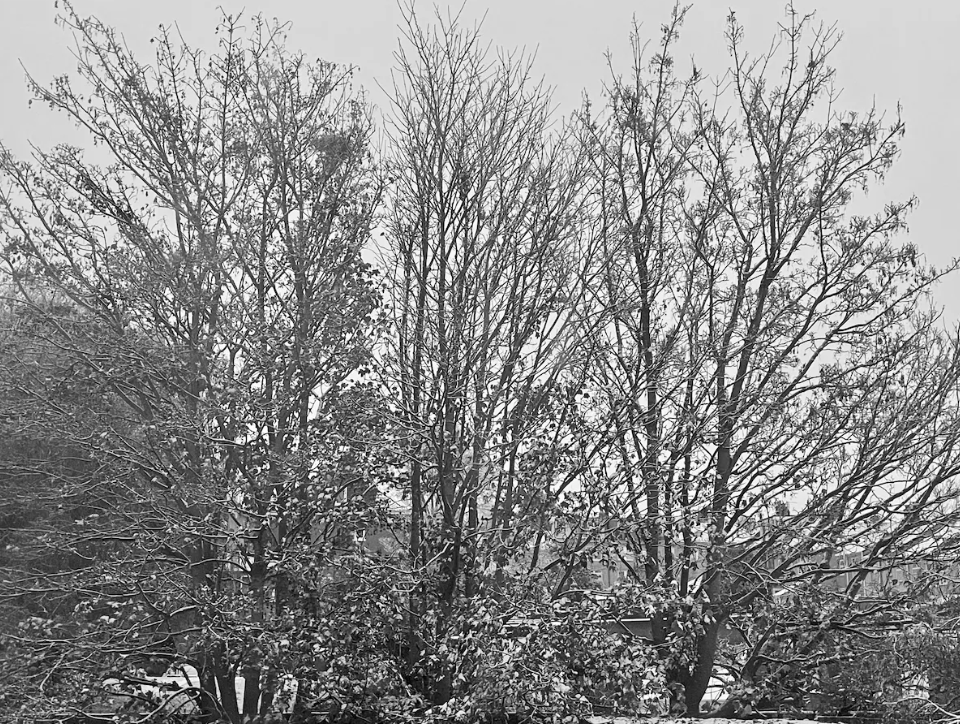
(Three Sisters covered in snow today – trees at the back of our garden – in my spiritual journeying, they serve as a gate to the other, spiritual world)
Let me offer an example. This Friday, I co-hosted our last eco-therapy session of 2022. This particular space was designed to support the staff of a local mental health charity and a local farm in their Nature Connectedness and well-being. Last spring, I had the opportunity to join the same group as a participant. During our sessions, we were offered an experience of a shamanic drum journey to meet our power animal. I like to venture into new ways of healing, especially since this is what liberation psychologies are all about, so I really enjoyed the process.
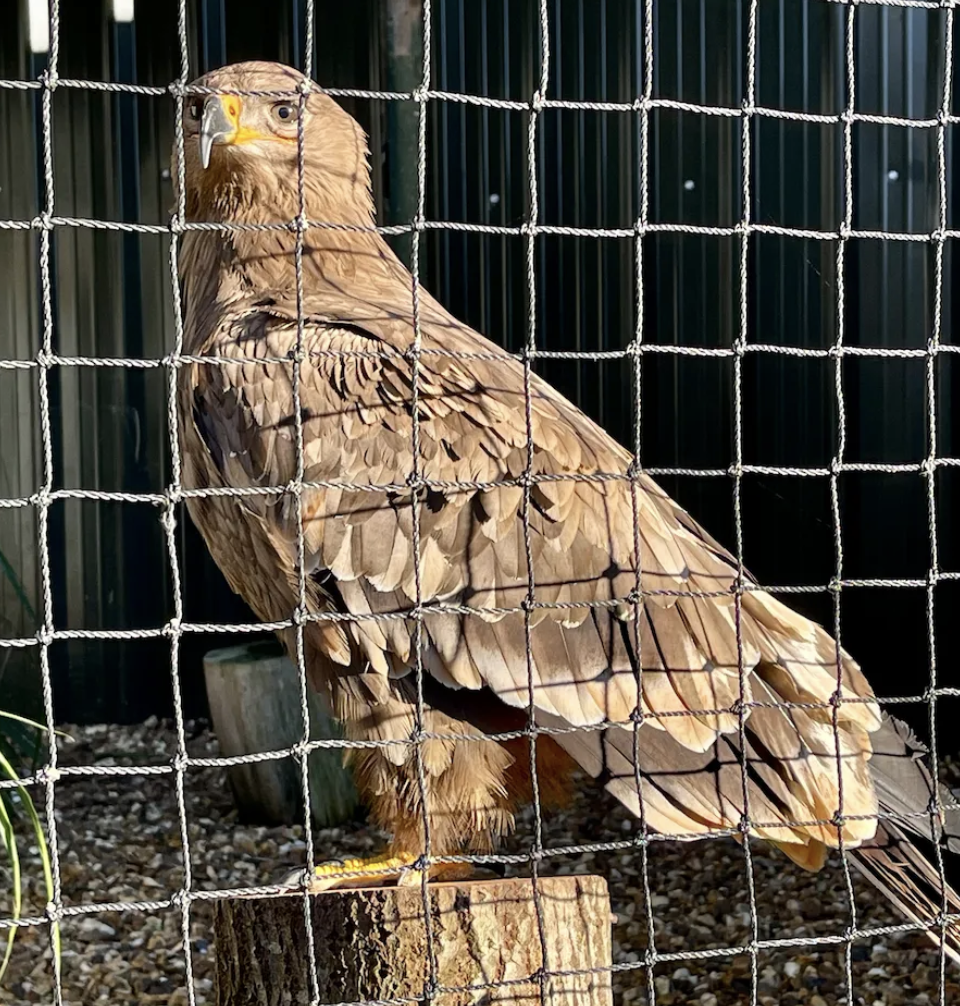
(Buckbeak, the steppe eagle)
I was stunned to discover that my animal guide was a steppe eagle – simply because my Tatar ancestors actually hunted with those eagles, and I did not even know they existed! Some shamans say we have a spiritual ancestry, while psychology speaks of intergenerational trauma and intergenerational memories we can carry up to 6-7 generations. I chose to follow my curiosity and explore what this part of my ancestors’ story may mean to me today. So I followed up our eco-therapy session with some online research and quickly discovered a local small zoo and falconry where a teen steppe eagle, Buckbeak, was available to visit. Meeting him was incredible – he bowed and listened to my introduction. I was told he was naughty (teen eagles tend to like mischief), but I saw a stunning animal in front of me. So this weekend, we went back to check in with Buckbeak, who is now an adult, in a larger enclosure and is even more majestic.
It really doesn’t mean much in my daily life, seemingly. It’s just an eagle in a local zoo. However, knowing this animal makes me feel more connected to my family stories of our Tatar ancestors – tribes that travelled the mid-Asian steppes to settle down in what is today known as Lithuania. And when I feel low and lonely when life throws a bit too much at me, sometimes I can close my eyes and escape into my inner world of past stories to find refuge, rest, and maybe even some inner wisdom too. I can post about my visits to the zoo and discuss them with my friends online – we can even come up with mutual experiences and make a collective meaning from those to move forward as a group, collective.
In practice, nurturing the connection with our animal spirit guides can be incredibly powerful when working with people who feel extremely isolated or may not have a safe support person. It helps us nurture their inner agency. It connects us with many cultures and builds bridges that unite us in our humanity. It is a practice that can be conducted on our own too, so if you are exploring your spirituality this way, please go softly and take care.
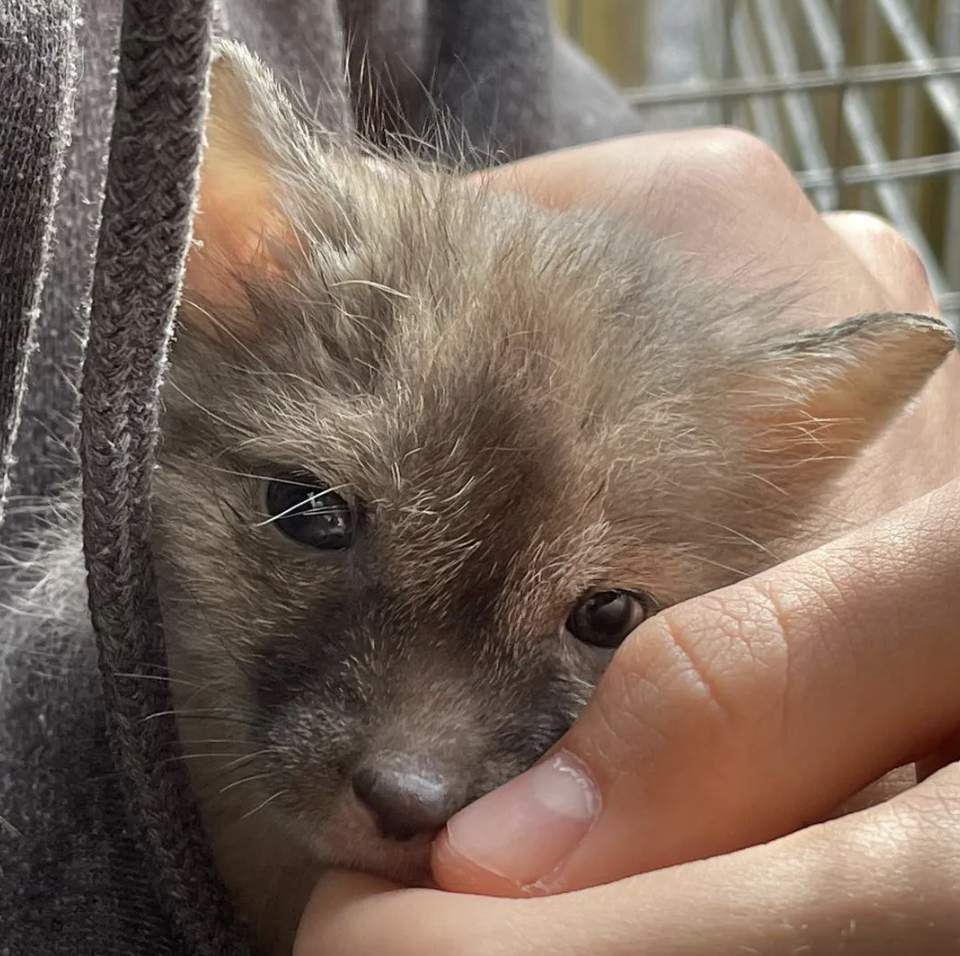
(Corsac fox cub)
Social media can also allow a little bit of serendipity. When I visited Buckbeak for the first time, I also met corsac foxes for the first time. I must admit, I never even dreamt of meeting an actual corsac fox – they are nocturnal travelling foxes living in Asia, so I did not know they could be kept in zoos. We still don’t know much about them, and they are endangered too. Meeting a pair of those little white foxes was quite incredible. You see, my family name is Korsak. In the Middle Ages, when my Tatar ancestors migrated to Lithuania (at the time Grand Duchy of Lithuania and the Polish-Lithuanian Commonwealth), they would wear winter coats made of corsac fox furs (today, the concept is highly unethical, but back then, it was a matter of survival). I remember my aunt and uncle explaining to me that family names came from nicknames often associated with special skills (see “Smith”, for instance). Thus, when our ancestors walked in a white winter coat through a village, people would call them “a Corsac” (a person wearing a coat made of corsac fur). The name stuck, and later, when our ancestors were invited to fight for the Polish king in war and rewarded property and family crest, it also became our official surname (only changed in its Russian branch; see Rimsky-Korsakov, the composer). I know a lot of stories about the Korsak family. I met someone online who shared with me solid ancestry research on this, too, so I did not have to do much myself. I just never really thought of seeking to see the actual animal.
So words cannot describe how moved I was to see a couple of corsac foxes in our local zoo. I could re-author my own story, too: the foxes are half the size of the regular fox, and so to hunt for them and make a coat would take a great level of skill. That explains why my Tatar ancestors, despite their minority status, were respected as great hunters and great warriors, too. The look of those white winter coats was sending a strong and stunning message indeed. That respect carries over until this day, and I receive it when sharing my ancestry with Polish ex-pats in the UK. And I also adjusted the meanings of those stories and treasure the idea of a personal zoo that preserves and aims to study the species. In fact, shortly after our visit, the foxes had cubs, and we were allowed to go, pet them for a short period of time and learn more about them. The cubs travel to other zoos, and the research and conservation work continues. I prefer not to interrupt the wild animal’s life cycle, but the educational visit was handled safely, so I got to hold a cub and watch this wild creature fall asleep on my lap. My dad always educated me on respect towards nature – responsible, native hunters practised restraint, reciprocity and care for nature – as we relied on it! And so that feeling of a sleeping fox was ever so grounding, grounding in the moment and my ancestral story – values, skills, experiences and responsibilities. And I can now share it online – on social media and here too. Isn’t that incredible? So this weekend, I checked in with the foxes, too – their winter coat is indeed stunning.
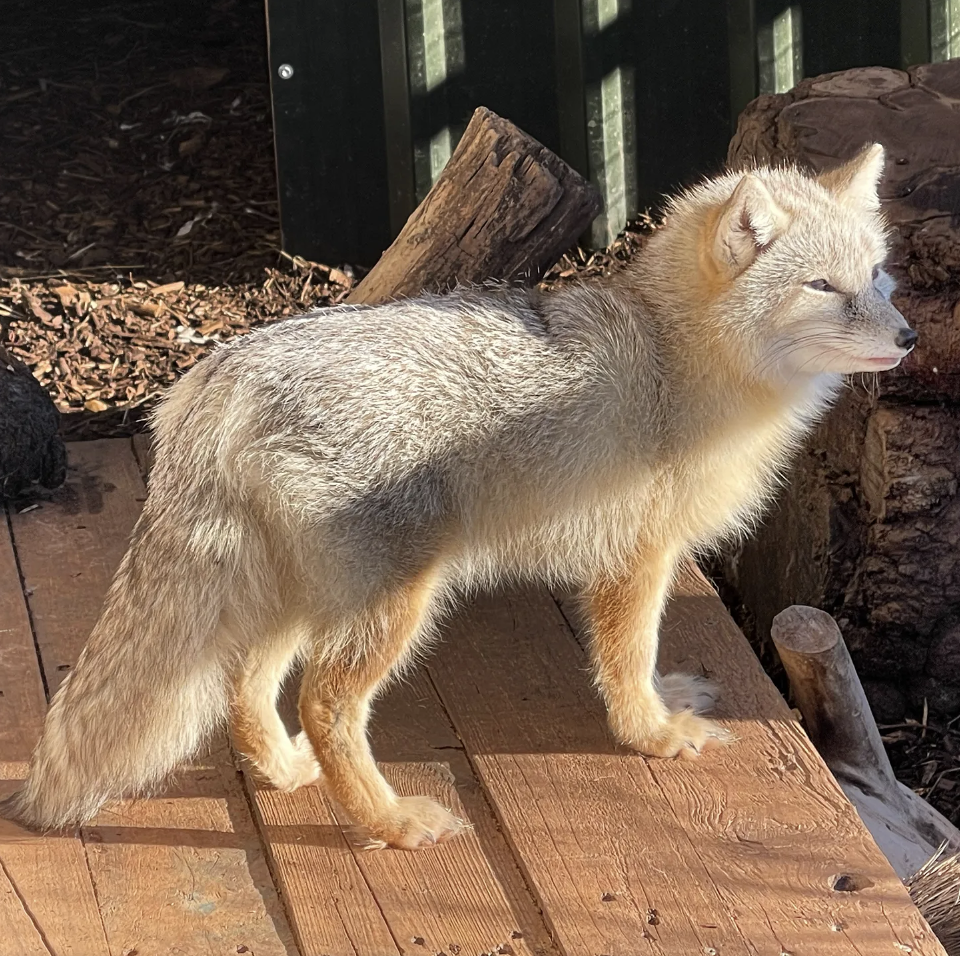
(Corsac fox in winter)
Before I finish my story, I would also like to add a note on safety when working on re-authoring of our stories. I happen to have the fortune of knowing my ancestry on one side of my family- it was passed on to me in my childhood, during long winter evenings and family gatherings. However, a lot of this narrative work can and is often conducted with people who struggle with their own story, may not wish to connect with it or may not even know it. My mother was adopted, I was estranged from my parents for a while, and I have experienced domestic abuse in the past. I know some stories are upsetting or unsafe to connect with or share online. So, if you work this way, please always start with consent – respect the client and the meaning they make of their ancestry or the lack thereof. Be client-led, go softly, and be wise in applying re-authoring, especially when working with open platforms like the leading social media channels or blogging. An intervention, an idea, or help even can only support healing if it privileges the client’s needs first.
(Reflection)
If you feel well and steady enough to try this way of working, working on your own stories may be helpful. Go softly, have soothing mechanisms and carry people in place to support you and please do remember the positive intent. Identity work is deep and can be very powerful, but it is also moving work. As you move, you need to steady yourself too. Here are some points for reflection:
Where do you come from? What is your ancestral story? Do you know it? Did anyone offer it to you? Did you actively seek it? How does it feel to know it or not know it?
Do you know the meaning of your first and second names? How does that make you feel? If you were to look it up – what meaning can you make of that?
Are the moments in your life story when you felt you were positively connecting with your own life and ancestral story? What were the benefits? What was the role of nature and digital technologies in those discoveries? What were the roles of your human tribes in those moments and those stories?
Looking at where you are today and where you are heading next: what is the story you tell yourself about your heritage and journey? What parts of your identity can support you in the next phase of your life – especially when significant changes happen in your life?
How much of this do you share online with your trusted friends or public audiences? How does it feel? What benefits could you imagine from safely sharing some authentic parts of your identity online? What would be the risks, and how can you prevent those in order to truly, safely benefit from the collective validation, conversations and further discoveries?
I also want to acknowledge that researching, writing, and assessing safety requires personal awareness, skill and understanding of digital tools. So please do what works for you. You can explore your identity in the comfort of your room, you can do so in closed online networks or over email, and you can do it in safe family WhatsApp groups. You can also exercise the choice of disconnecting from your roots if this is what supports your safety, good mental health and wellbeing. That right is yours to choose and exercise.
(While I am still thinking about foxes and our own resident fox in our street, nesting amongst the Three Sisters trees at the back of our garden, I am going to go outside to check on my dog – she loves the snow, and so this is going to a be a fun day for her and for all of us. Wishing you a light Sunday!)
Update: the first published copy of this article contained two mistakes: I stated that the term “spirit animal’ is reserved for First Peoples of the USA and that the spirit animal journeying needs to be done with a qualified professional. I was wrong. I apologise for those mistakes, and I have corrected both now. Anyone can do journeying in the comfort of their home as long as they are okay to return from their spiritual explorations. The term “spirit animal” exists in many cultures. APA reserves it for any spiritual practice vs. referring to simply your favourite animal.
This post was originally posted on Substack in our Syl’s Liberation Psychologies Newsletter.

